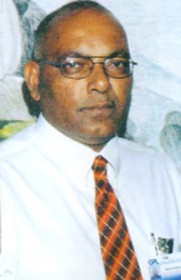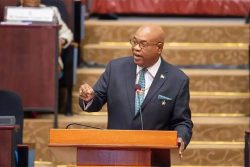Says ‘big stick’ bill should not be used to label people in Sophia
The theft of electricity from the Guyana Power and Light Company (GPL) which is costing the company “untold millions of dollars” has been sustained by a web of corruption within the power company itself which, a GPL source has told Stabroek Business, “sometimes involves persons operating in influential positions within the company.”
The source, who contacted Stabroek Business shortly after the recent passage in the National Assembly of the Electricity Sector Reform (Amend-ment) Bill said that while it is customary to link electricity theft “predominantly with illegal power connections in places like Sophia,” many of the instances of power theft are linked to people who receive electricity through “perfectly legal arrangements with GPL.” The source told this newspaper that “some of these cases involve “supposedly reputable business people” and that there are cases in which “the losses run into millions of dollars,” adding that some of these losses “are quietly written off” without any consequence to the perpetrators.

Stabroek Business contacted the office of GPL Chief Executive Officer Bharrat Dindyal to secure a comment on the claims made by the official but received no response despite a promise from a staffer that a telephone call would be returned.
“The interesting thing is that whenever we think of power theft we tend to think of those illegal connections in places like parts of Sophia. That, in a sense, is what you may call the visible face of power theft, incidents that are played up in the media. We hear less about those cases where persons with legitimate access to electricity tamper with their meters and with the wiring in their homes to cause less consumption to be accounted for.
Some of these cases have involved influential people, business people, even people connected with GPL,” the source said. Asked whether corrupt practices involving the complicity of GPL staff in consumer theft of power was endemic, the source said that it would probably be misleading to make such an assumption. “GPL is the kind of company where people might have very little authority but a lot of influence … You just have to be in a particular position and you can become part of a racket,” the source said. And according to the source, some people who may have influence “either directly with GPL or with the system as a whole” appear to regard access to cheaper electricity as “an entitlement.”
A few years ago this newspaper reported on an allegation that a member of the Board of Directors of the power company sought to have a supervisor transferred after the supervisor sought to have the individual’s domestic power supply disconnected for outstanding amounts in electricity tariffs totalling more than $300,000.

In another case, a city business premises in which a prominent private sector functionary reportedly has an interest, was allegedly found to have a meter that had been ‘doctored’ to register significantly reduced electricity consumption levels. Other GPL officials were reportedly fingered some years ago in a multi-million dollar electricity tariff avoidance racket involving a Chinese restaurant in Georgetown.
The GPL source explained that given the high cost of electricity there was no shortage of consumers, “some of them in business,” who are prepared “to invest in lower electricity bills.” The source said that while it seemed that “rackets” involving cliques of GPL employees were less now than they were a few years ago, there is every evidence that power theft persists with “the knowledge and sometimes the complicity of people inside GPL. Sometimes disclosure can be awkward and embarrassing,” the source added.
The provisions of the Electricity Sector Reform (Amendment) Bill empower the power company to withdraw service from anyone convicted on multiple offences under the Act. Dubbed the “big stick” measure by Prime Minister Samuel Hinds, the legislation seeks to target both consumers found stealing electricity as well as GPL officials found to be complicit in power theft rackets.
But the GPL source told Stabroek Business that if the amended legislation “is to count for anything” GPL had to “look inward” as well as to focus attention on “people of influence” who steal electricity with impunity. “Sometimes it appears almost comical when we try to create the impression that the real problem with power theft is located in places like Sophia.” The source said that what he feared most was the likelihood that under the new regulations “a few people from places like Sophia would be made examples of” under the pretext that something is being done about electricity theft.








